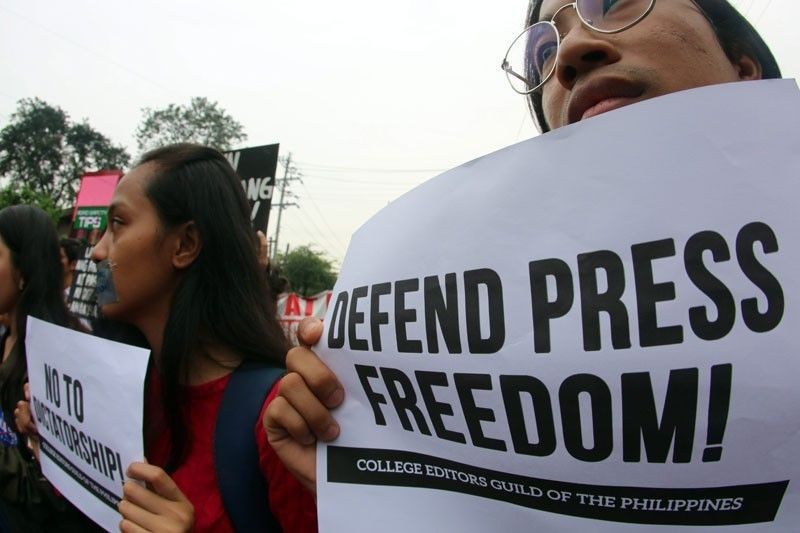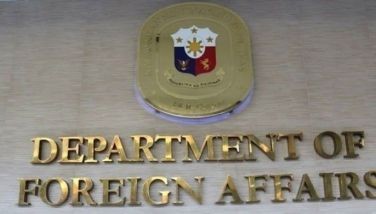Lawyers: Press freedom threatened by sedition, cyberlibel laws

MANILA, Philippines — While the Constitution affirms the protection of media workers under freedom of the press, this right is continuously being threatened by libel, cyberlibel and sedition laws, according to the Free Legal Assistance Group.
FLAG issued the two-page statement yesterday on the occasion of World Press Freedom Day.
The human rights lawyers’ group assured its media partners that the existence of a free and responsible press is essential in having a truly transparent, accountable and democratic government.
“A free press is not an optional extra but an integral part of the liberty to enjoy all other freedoms,” FLAG added.
Under Section 4 of the Constitution, “No law shall be passed abridging the freedom of speech, of expression, or of the press, or the right of the people peaceably to assemble and petition the government for redress of grievances.”
It added that the freedom of the press has repeatedly been affirmed by the Supreme Court (SC) and called it a “preferred right that stands on a higher level than substantive freedom or other liabilities.”
“Yet, the reality is that, despite the clarity of the constitutional provision, it is a protection that is continuously threatened by existing laws that criminalize content, such as laws on libel and cyberlibel, sedition and inciting to sedition, and section 6(f) of the Emergency Powers Law that criminalizes the posting of the undefined phrase ‘false information,’” said FLAG.
It added there had been reports of journalists being killed in the practice of their profession yet there is no speedy or adequate remedy in the ordinary course of law at hand to fully investigate, prosecute, and hold accountable those liable.
“It is a protection that becomes illusory when the press are viewed as prey rather than partners,” FLAG added.
In a related development, Sen. Francis Pangilinan, in his statement on the observance of World Press Freedom Day, decried the arrest of volunteers giving out food and other relief items, and the harassment of journalists amid the coronavirus disease 2019 (COVID-19) pandemic.
“This World Press Freedom Day, let’s all remember who the the real enemy is,” Pangilinan said. “The virus is the enemy, not the volunteers. The virus is the enemy, not journalists.”
He lamented that despite the crisis, arrests of well-meaning volunteers, and harassment of journalists continue.
“While Filipino men and women are being jailed for quarantine violations, Chinese POGO (Philippine offshore gaming operators) workers are exempted from the quarantine,” Pangilinan said.
He said the authorities and the public must trust in the “help and dedication” of volunteers during this crisis as each citizen is part of the solution and their work is to extend assistance to those not assisted by the government.
“Let’s all trust in the capacity of our journalists to disseminate accurate and useful information. During these times when everyone is online and spending time in the internet, the spread of fake news and misleading reports, it will be the journalists who can correct them,” Pangilinan said.
Continued promotion of press freedom
Meanwhile, in its World Press Freedom Day message, the Presidential Communications Operations Office (PCOO) said press freedom has allowed for the continued delivery of news to Filipino households as the country grapples with the pandemic.
Press freedom, the PCOO said, also helped voice out the public’s pulse and enabled the government to increase public awareness of its policies, and to report its activities with “complete transparency.”
“As the movement of and access to rightful and truthful information are products of the continuous engagement among the government, the press, and civil society, the Duterte administration aims to protect and maintain this co-existence... We will continue to endeavor towards the continued promotion of press rights and freedom,” PCOO Secretary Martin Andanar said.
Some groups claim there is a “climate of fear” among journalists in the Philippines because of threats to free expression, including the presence of online trolls that harass those who are critical of the government and the unsolved murders of media workers.
They also cited efforts to shut down news website Rappler and to block the renewal of the franchise of broadcast giant ABS-CBN. Both media outlets have been accused of biased reporting by the administration and its supporters. Media groups and educators have said the government’s actions against Rappler and ABS-CBN constitute an attack on press freedom.
Officials have denied this, saying they are just following the rule of law and are making the two media outlets accountable for their alleged violations.
The Philippines’ ranking in the Reporters Without Borders 2020 World Press Freedom Index fell two notches to 136th out of 180 countries from 134th in 2019. In an article posted on its website, Reporters Without Borders said the COVID-19 crisis has “highlighted the main elements of the authoritarian course” taken by President Duterte. The group said at least two journalists are facing two-month prison terms for spreading “fake news” about the coronavirus crisis because of the passage of the Bayanihan to Heal As One Act.
The group also cited the alleged coverage restrictions imposed on alternative news outlet Bulatlat, and the forcing of a journalist to apologize publicly for criticizing the supposed government inaction over the pandemic. – Alexis Romero, Paolo Romero
- Latest
- Trending






























